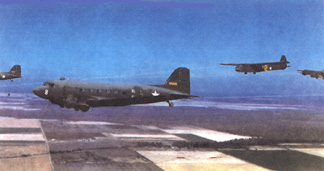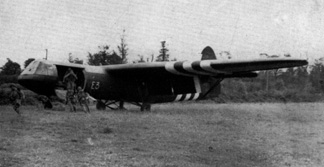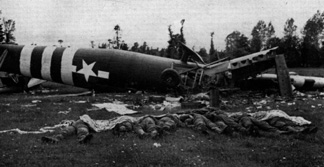|
in honor of Maj. Norman K. Arvidson
Chapter 5
A THANK YOU TO A BRAVE DAD AND THE REST OF HIS GENERATION As we note the 54th anniversary of the beginning of the Liberation of Europe (D-Day), I would like to pass on to you and all who read your publication a history lession I have learned through my father and those of his generation who made my generation’s present and future possible. Four years ago, my two sisters, brother and I had the honor to accompany my father, a D-Day veteran, to the 50th Anniversary celebrations in Normandy, France, and particularly Sainte-Mere-Englise. This was the first town liberated by Allied forces on that “Longest Day.” On the night of June 5, 1944, five days after his 22nd birthday, my father climbed into the cockpit of an unarmed C-47 transport. As a pilot of the 87th Troop Carrier Squadron of the 438th Troop Carrier Group, based at Greenham Commons in England. He flew a “stick” of 18 paratroopers of the soon-to-be famous 101st Airborne (“Screaming Eagles”) into Normandy. His plane was the third of a three-plane flight that spearheaded the invasion of German-held France. Flying at near wave top height in blacked-out aircraft to evade enemy detection, they dashed across the English Channel, dodging the Channel Islands along the way to avoid the enemy anti-aircraft gun emplacements. Shortly after midnight on June 6, as the 87th neared the western beaches and cliffs of the Caretan Peninsusla, the transpsorts rose up to about 700 feet altitude for the final run on the “drop zone.” This was not an easy task because of the low cloud cover that blanketed the invasion area that night. Within a few quick minutes the squadron had sped over the countryside toward its designated drop zones in the vicinity of Sainte-Mere-Englise. In spite of increasingly heavy enemy ground fire, total radio blackout and poor weather, the pilots of the 87th were able to maintain formation and carry out their mission of delivering the first airborne troops to engage the enemy and begin the Liberation of Europe. Just as quickly, the now empty C-47s were flown over the still quiet Utah Beachhead and back to the base for another mission. More paratroopers and supplies were loaded. Additionally, gliders carrying men and equipment were towed behind each C-47 for a daylight run into the combat areas behind Utah Beach.
C-47 Dakotas practice towing gliders in training.
Learn more about the USAAF Waco CG-4A French people we met during our all too brief visit were very warm and gracious to my father and his comrades-in-arms. Time and again they were thanked and welcomed for the deeds they had done. One of our hosts was a boy of about 10 when the liberators came “out of the dark sky” and brought freedom with the new day. During the occupation he had been forced to do menial work for the German troops. When asked what he remembered most about the liberation, he said “When the Germans came they marched in singing. When the Americans landed, the Germans left crying.” Time and again we heard similar stories and outpourings of gratitude. During a special memorial service in Sainte-Mere-Englise at the site of the former American military cemetaries located there (casualties were temporarily buried there in the first bit of freed French soil and later removed to the present cemetary overlooking Omaha Beach), the mayor of Sainte-Mere-Englise addressed those gathered to remember the sacrifices for freedom that were paid for by those young men. Troops moving off to battle after a successful D-Day landing. Photo ctsy “Life’s Picture History of World War II” Parachute silk shrouds eight dead soldiers Photo ctsy “Life’s Picture History of World War II” A mayor from one of the surrounding villages also gave a touching reminder of the cost of freedom. “To these shores came the sons and grandsons of Europe. Decendents of those who had left the Old World to find a better life in the New World, they returned to free their ancestral homes from tyranny. Many, so many, gave up their lives and their future that we, our children and grandchildren might have a future. May we be worthy of the price paid by these gallant warriors.” So often I hear or read stories of how some Europeans, especially the French, are rude or condescending to Americans. What I learned and witnessed as I walked among the hedgerows of Normandy, the stone-built villages scattered throughout the countryside, the low sand dunes of Utah Beach and ghostly white markers of the cemetary at Omaha Beach is that they are truly appreciative of what those “young smiling men” did for them. I, too, say, “Thank you Dad - you and your generation.” Gary Allin End of Chapter 5 — Go to Chapter 6
Cover — Introduction — Table of Contents Chapter — 01 — 02 — 03 — 04 — 05 — 06 — 07 — 08 — 09 — 10 Or Go To Or |
|||||||||


